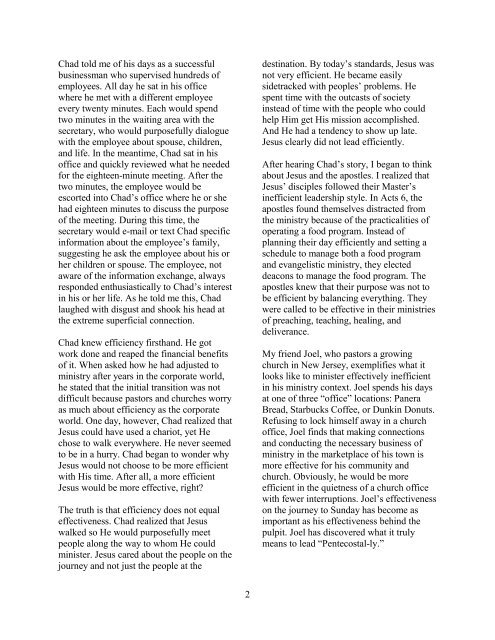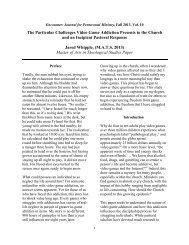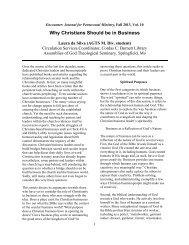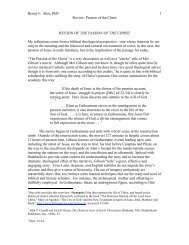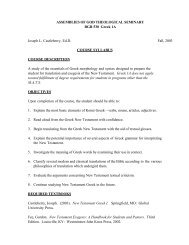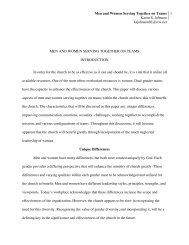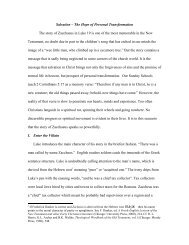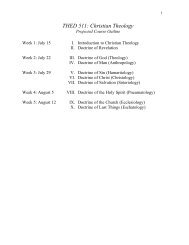Encounter: Journal for Pentecostal Ministry - Assemblies of God ...
Encounter: Journal for Pentecostal Ministry - Assemblies of God ...
Encounter: Journal for Pentecostal Ministry - Assemblies of God ...
You also want an ePaper? Increase the reach of your titles
YUMPU automatically turns print PDFs into web optimized ePapers that Google loves.
Chad told me <strong>of</strong> his days as a successful<br />
businessman who supervised hundreds <strong>of</strong><br />
employees. All day he sat in his <strong>of</strong>fice<br />
where he met with a different employee<br />
every twenty minutes. Each would spend<br />
two minutes in the waiting area with the<br />
secretary, who would purposefully dialogue<br />
with the employee about spouse, children,<br />
and life. In the meantime, Chad sat in his<br />
<strong>of</strong>fice and quickly reviewed what he needed<br />
<strong>for</strong> the eighteen-minute meeting. After the<br />
two minutes, the employee would be<br />
escorted into Chad’s <strong>of</strong>fice where he or she<br />
had eighteen minutes to discuss the purpose<br />
<strong>of</strong> the meeting. During this time, the<br />
secretary would e-mail or text Chad specific<br />
in<strong>for</strong>mation about the employee’s family,<br />
suggesting he ask the employee about his or<br />
her children or spouse. The employee, not<br />
aware <strong>of</strong> the in<strong>for</strong>mation exchange, always<br />
responded enthusiastically to Chad’s interest<br />
in his or her life. As he told me this, Chad<br />
laughed with disgust and shook his head at<br />
the extreme superficial connection.<br />
Chad knew efficiency firsthand. He got<br />
work done and reaped the financial benefits<br />
<strong>of</strong> it. When asked how he had adjusted to<br />
ministry after years in the corporate world,<br />
he stated that the initial transition was not<br />
difficult because pastors and churches worry<br />
as much about efficiency as the corporate<br />
world. One day, however, Chad realized that<br />
Jesus could have used a chariot, yet He<br />
chose to walk everywhere. He never seemed<br />
to be in a hurry. Chad began to wonder why<br />
Jesus would not choose to be more efficient<br />
with His time. After all, a more efficient<br />
Jesus would be more effective, right?<br />
The truth is that efficiency does not equal<br />
effectiveness. Chad realized that Jesus<br />
walked so He would purposefully meet<br />
people along the way to whom He could<br />
minister. Jesus cared about the people on the<br />
journey and not just the people at the<br />
2<br />
destination. By today’s standards, Jesus was<br />
not very efficient. He became easily<br />
sidetracked with peoples’ problems. He<br />
spent time with the outcasts <strong>of</strong> society<br />
instead <strong>of</strong> time with the people who could<br />
help Him get His mission accomplished.<br />
And He had a tendency to show up late.<br />
Jesus clearly did not lead efficiently.<br />
After hearing Chad’s story, I began to think<br />
about Jesus and the apostles. I realized that<br />
Jesus’ disciples followed their Master’s<br />
inefficient leadership style. In Acts 6, the<br />
apostles found themselves distracted from<br />
the ministry because <strong>of</strong> the practicalities <strong>of</strong><br />
operating a food program. Instead <strong>of</strong><br />
planning their day efficiently and setting a<br />
schedule to manage both a food program<br />
and evangelistic ministry, they elected<br />
deacons to manage the food program. The<br />
apostles knew that their purpose was not to<br />
be efficient by balancing everything. They<br />
were called to be effective in their ministries<br />
<strong>of</strong> preaching, teaching, healing, and<br />
deliverance.<br />
My friend Joel, who pastors a growing<br />
church in New Jersey, exemplifies what it<br />
looks like to minister effectively inefficient<br />
in his ministry context. Joel spends his days<br />
at one <strong>of</strong> three “<strong>of</strong>fice” locations: Panera<br />
Bread, Starbucks C<strong>of</strong>fee, or Dunkin Donuts.<br />
Refusing to lock himself away in a church<br />
<strong>of</strong>fice, Joel finds that making connections<br />
and conducting the necessary business <strong>of</strong><br />
ministry in the marketplace <strong>of</strong> his town is<br />
more effective <strong>for</strong> his community and<br />
church. Obviously, he would be more<br />
efficient in the quietness <strong>of</strong> a church <strong>of</strong>fice<br />
with fewer interruptions. Joel’s effectiveness<br />
on the journey to Sunday has become as<br />
important as his effectiveness behind the<br />
pulpit. Joel has discovered what it truly<br />
means to lead “<strong>Pentecostal</strong>-ly.”


